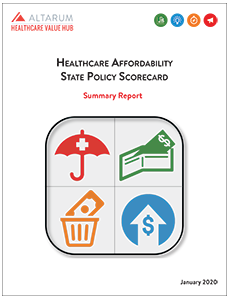What Do Consumers Say?
Consumers from every walk of life are experiencing hardship due to high health care costs and frequently cite health care affordability as a top priority for their elected officials, as shown by recent polling below. Concerns about high health care costs and bipartisan support for policymaker action have also been found at the state level, as shown in the Hub’s Consumer Healthcare Experience State Surveys. Moreover, a custom analysis shows how hardship due to high costs varies at the state level.
All Consumers |
|
RWJF Healthcare Affordability Poll, 2021: "Now more than ever, there is widespread support for policies to lower healthcare costs as consumers continue to make sacrifices such as delaying or forgoing care. Those with lower incomes, who are disproportionately people of color, report feeling the strain of high healthcare costs more than others, illustrating that lowering costs can help advance health equity." |
|
"A new survey shows a majority think it is very important for Congress to take action to lower health care prices. Voters from across the political spectrum express support for a range of policies to lower prices, including 78% who support government limits on the prices that hospitals can charge." |
|
Kaiser Family Foundation Health Tracking Poll, 2018: "Leading up to the 2018 general election, KFF found at least twice as many voters said they wanted to hear candidates talk about healthcare costs (27%) as any other healthcare issue, such as increasing access or decreasing the number of uninsured people (11%) or universal coverage (8%)." |
|
Kaiser Family Foundation Data Note, 2019: "Among those with employer-sponsored health coverage, twice as many say cost-related concerns are the "most important" feature to them when choosing a health plan compared to coverage-related concerns. This is a flip in priorities from the 2003 survey which found a larger share saying the most important feature to them was coverage-related, such as having a range of benefits or choice of providers." |
|
West Health and Gallup Study, 2020: "Nearly nine in 10 U.S. adults are 'very' (55%) or 'somewhat' (33%) concerned that the pharmaceutical industry will leverage the COVID-19 pandemic to raise drug prices... Overall, 79% are very or somewhat concerned about their health insurance premiums rising and 84% are very or somewhat concerned about the cost of care generally rising, with 41% very concerned about each." |
|
UChicago Harris/AP-NORC Poll, May 2020: "Sixty-two percent are very concerned about others not having access to high-quality healthcare; just 46% say the same about their own access. This 16-point gap has increased from a 1-point gap in February [2020]... Seventy percent say that the private sector does a better job than the government in driving innovation in health care, including 81% of Republicans and 63% of Democrats... Fifty percent would prefer an insurance plan with broader coverage but higher costs, while 45% want one with lower costs but less coverage." |
Democrats |
Kaiser Family Foundation Health Tracking Poll, October 2019: "A majority of Democrats and Democratic-leaning Independents say the Democratic candidates for president are spending too little time talking about women's healthcare (56%) and surprise medical bills (52%) and half say the candidates are spending too little time discussing ways to lower healthcare costs (50%). |
|
Republicans |
RealClear Opinion Research, May 2019: "When poll respondents were asked to rank their three top priorities for improving healthcare, lowering costs beat our expanding availability... 58% of Republicans cited lowering costs as their top priority. Second choice among Republicans (48%) was "making sure healthcare decisions are made by doctors and not insurance companies or government," while 45% of Repulicans named lowering drug costs." |
|
Swing Voters |
Kaiser Family Foundation Data Note, 2019: "Nearly half (44%) of swing voters who prefer the Democratic nominee on healthcare offer responses related to increasing access to health insurance coverage as the reason why they support the Democratic nominee on this issue. Swing voters who prefer President Trump on healthcare do not appear to be rallying behind a single healthcare issue but offer varying responses. Lowering the amount people pay for healthcare ranks high for both sets of swing voters (19% and 16%, respectively)." |
|
Latino Voters |
UNIDOSUS 2020 National Latino Electorate Survey, June 2019: "On issues, the top three priorities Latino voters would like to see their ideal presidential candidate focus on are healthcare, jobs and the economy, and immigration... When asked to name their number-one priority for candidates, 23% chose the economy and jobs, 17% chose healthcare and 15% chose immigration... Under healthcare, voters are concerned about cost and access to coverage." |
|
African American Voters |
BlackPAC National Poll of Registered Black Voters, May 2019: "43% of respondents identify healthcare as a critical issue, particularly among Black women over 50 (53%) and voters in the Couth over 50 (57%). |
|
|
Black Futures Lab, Black Census 2019: "Most of the respondents agree that the lack of affordable healthcare is a problem in the community (86%)... This problem is of particular concern for Black Census respondents over the age of 60. 84% of senior respondents say the lack of afffordable healthcare is a "major problem," while 73% of young respondents under age 30 say the same." |
||
Asian American Voters |
APIA Vote and AAPI Data: 2018 Asian American Voter Survey: When ranking issues as extremely important, Asian American registered voters ranked health care as the number one extremely important election-related issue in 2018, tied with jobs and the economy. |
|








